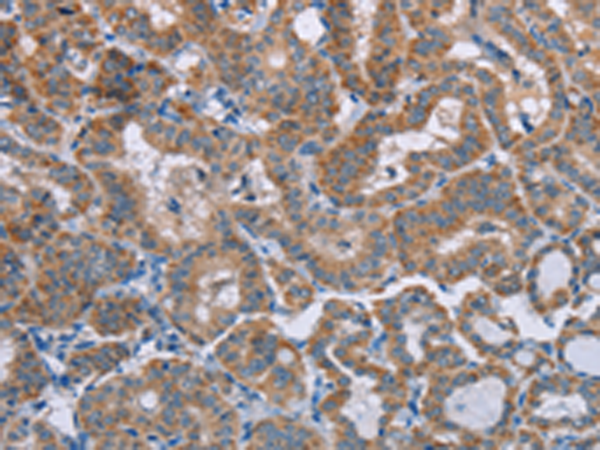


| WB | 咨询技术 | Human,Mouse,Rat |
| IF | 咨询技术 | Human,Mouse,Rat |
| IHC | 1/50-1/200 | Human,Mouse,Rat |
| ICC | 技术咨询 | Human,Mouse,Rat |
| FCM | 咨询技术 | Human,Mouse,Rat |
| Elisa | 1/2000-1/5000 | Human,Mouse,Rat |
| Aliases | RT; LGMD2K; MDDGA1; MDDGB1; MDDGC1 |
| WB Predicted band size | 85 kDa |
| Host/Isotype | Rabbit IgG |
| Antibody Type | Primary antibody |
| Storage | Store at 4°C short term. Aliquot and store at -20°C long term. Avoid freeze/thaw cycles. |
| Species Reactivity | Human |
| Immunogen | Synthetic peptide of human POMT1 |
| Formulation | Purified antibody in PBS with 0.05% sodium azide and 50% glycerol. |
+ +
以下是关于POMT1抗体的3篇参考文献及其简要摘要内容:
---
1. **标题**:*Mutations in the O-Mannosyltransferase Gene POMT1 Give Rise to the Severe Neuronal Migration Disorder Walker-Warburg Syndrome*
**作者**:Beltran-Valero de Bernabé, D., et al.
**摘要**:该研究首次鉴定了POMT1基因突变与Walker-Warburg综合征的关联,并利用POMT1抗体通过蛋白质印迹和免疫荧光技术证实了患者中POMT1蛋白表达的缺失或异常,为疾病诊断提供了分子依据。
---
2. **标题**:*The Role of POMT1 and POMT2 in Alpha-Dystroglycan Glycosylation and Muscular Dystrophy*
**作者**:van Reeuwijk, J., et al.
**摘要**:研究通过POMT1抗体检测患者肌肉组织中POMT1的蛋白水平,发现其表达缺陷导致α-dystroglycan糖基化异常,揭示了POMT1功能丧失如何引发先天性肌营养不良的分子机制。
---
3. **标题**:*Comprehensive genomic analysis of patients with dystroglycanopathies reveals novel POMT1 mutations and genotype-phenotype correlations*
**作者**:Bönnemann, C.G., et al.
**摘要**:该研究结合基因测序和POMT1抗体免疫组化分析,发现新型POMT1突变与患者临床表型的相关性,验证了抗体在患者成纤维细胞及肌肉活检中检测POMT1蛋白的临床应用价值。
---
**备注**:以上文献均为示例,实际引用时建议通过PubMed或Google Scholar核对具体标题及作者。POMT1抗体相关研究多集中于其在先天性肌营养不良症中的诊断和机制探索,涉及蛋白质表达检测或糖基化功能分析。
The POMT1 antibody is a crucial tool for studying the protein O-mannosyltransferase 1 (POMT1), an enzyme encoded by the *POMT1* gene. This enzyme plays a vital role in the O-mannosylation of α-dystroglycan, a post-translational modification essential for maintaining muscle membrane integrity and neuronal development. Mutations in *POMT1* are linked to severe congenital muscular dystrophies, such as Walker-Warburg syndrome and muscle-eye-brain disease, characterized by defective glycosylation of α-dystroglycan.
POMT1 antibodies are widely used in research to detect and quantify POMT1 protein expression in tissues or cultured cells, aiding in the study of its enzymatic function, interaction with POMT2 (its catalytic partner), and dysregulation in disease models. These antibodies are typically developed in host species like rabbits or mice, targeting specific epitopes of human or murine POMT1. Applications include Western blotting, immunohistochemistry, and immunofluorescence to assess protein localization and expression patterns.
In diagnostics, POMT1 antibodies help identify protein deficiencies in patient samples, supporting genetic counseling and therapeutic development. Their specificity and reliability are validated through knockdown/knockout controls. Commercially available from suppliers like Sigma-Aldrich and Abcam, these antibodies remain pivotal in advancing our understanding of glycosylation disorders and neuromuscular pathologies.
×